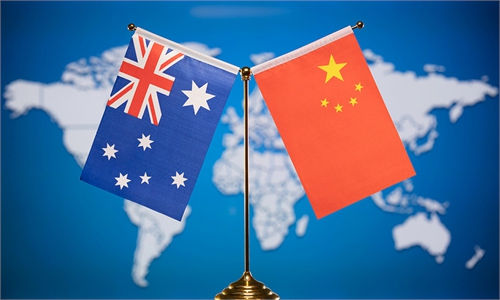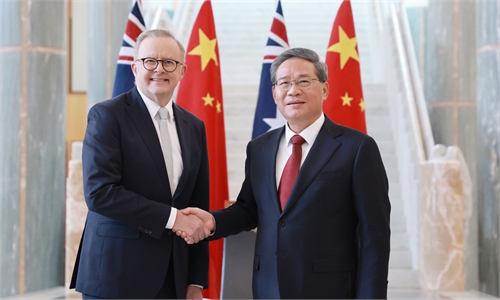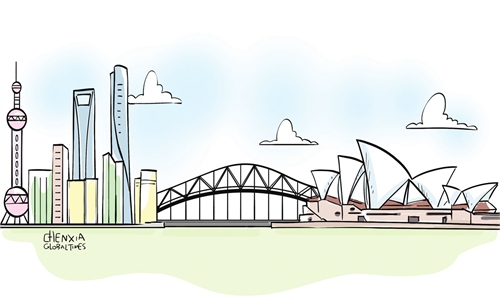OPINION / GLOBAL MINDS
Despite challenges, positive development indicates progress in China-Australia ties

Illustration: Xia Qing/GT
Editor's Note:Chinese Premier Li Qiang wrapped up his Australia visit on Tuesday. The visit underscores the significance of the Australia-China relationship, and essentially Australia wants to "stabilize" its relations with China, Percy Allan (Allan), a visiting professor at the Institute for Public Policy and Governance, University of Technology Sydney, former secretary of New South Wales Treasury and Chair of NSW premier's Council on the Cost and Quality of Government, told Global Times (GT) reporters in an interview. Allan mentioned that a deeper relationship should develop, but that will take time since trust needs to be reestablished not only at diplomatic and business levels, but also in the Australian mass media.
GT: How do you interpret the significance of Premier Li's visit?
Allan: Chinese Premier Li Qiang's visit to Australia this month holds considerable importance. It marks the first visit by a Chinese premier to Australia since 2017. During his stay from June 15 to June 18, Premier Li engaged in an Annual Leaders' Meeting with Australian Prime Minister Anthony Albanese in Canberra. They have discussed bilateral, regional and international issues. Additionally, Premier Li traveled to Adelaide and Perth, fostering economic and trade cooperation.
The visit underscores the significance of the Australia-China relationship, especially given China's status as Australia's largest trading partner. It also allows both sides to discuss areas of agreement and cooperation, and discuss matters of disagreement and how to manage these to avoid misunderstandings and acrimony as has happened in the past. Where differences of opinion remain, these should be recognized and respected rather than weaponized.
Essentially, Australia wants to "stabilize" its relations with China. This may fall short of China's eagerness to develop closer relations with Australia as was originally agreed in the 2014 China-Australia Comprehensive Strategic Partnership. A deeper relationship should develop, but that will take time since trust needs to be reestablished not only at diplomatic and business levels, but also in the Australian mass media whose China opinion writers have almost all become Sinophobes warning that China is trying to subvert and attack its neighbors, including Australia.
In one case our leading dailies, the Sydney Morning Herald and Melbourne Age newspapers ran a front-page series called "Red Alert" which tapped into a panel of China hawks that predicted we would be attacked by China within three years. The Australian Strategic Policy Institute (ASPI), which is partially funded by Australian and overseas defense departments and contractors, regularly publishes policy papers on the "China threat" that the Australian media cite as independent and objective analyses.
This unwarranted alarmism has resulted in half of Australians believing there is a real possibility of military conflict with China within three years, according to a survey by the Australia-China Relations Institute.
A high priority of the dialogue between the Chinese premier and the Australian prime minister should be a bilateral agreement that both China and Australia will guarantee the safety of journalists from each country, based in the other country, as well as their freedom to report news and opinion without being interrogated or detained for doing their work.
Unfortunately, the breakdown in media relations occurred after Australian intelligence officers in June 2020 raided the homes of four Chinese journalists, interrogated them in front of their families and seized their laptops, mobile phones and other devices. I suspect these journalists fled back to China after that ugly incident. In September 2020, two Australian journalists in China were not allowed to leave the country until they answered questions about a detained Australian anchor on Chinese TV. They considered that intimidating and unnecessary and thereafter returned to Australia.
Since then, we have had no Australian journalists reporting from within China. As a result, China's story is not being told in Australia. Until that is fixed it is doubtful local public opinion will change because it is shaped by media reporting. Pearls and Irritations is one of the few public policy blogs that publishes articles on why China is not an imperialist nation planning to invade the rest of Asia as Japan did in the 1930s and 1940s. But its readership is small compared with the mass media giants like Nine Entertainment, News Corporation and the Australian Broadcasting Corporation.
GT: China-Australia relations saw a "breakthrough" in 2023, with increasing high-level visits and interactions. What do you think is the biggest reason behind this?
Allan: It was clearly the change to a Labor government in 2022. The previous Coalition government agreed to a China-Australia Comprehensive Strategic Partnership in 2014. That was followed by a Free Trade Agreement in 2015 which enhanced our competitive position in the Chinese market and facilitated Chinese investment in Australia. Private Chinese investors were granted equal status with investors from the US, New Zealand, Japan, South Korea and Chile.
However, over the next five years, the Australian government under the new coalition prime minister, Malcolm Turnbull, and his successor Scott Morrison, proceeded to abrogate these agreements and trash their spirit of mutual cooperation. Australia blocked Chinese steel and aluminum products using anti-dumping measures. Later, the World Trade Organization found that the duties imposed by Australia were flawed. The Australian government then blocked Chinese investments in Australia, including in a drinks company that had no strategic significance. It also led the world in banning Huawei technology even though it offered the best 5G mobile system.
Australian intelligence agents raided the residences of four Chinese journalists, interrogated them in front of their families and seized their computers and smartphones. It also subjected Confucius Institutes in Australian universities to closer scrutiny even though language, cultural or policy institutes linked to other nations escaped such attention (e.g. Goethe, US Studies Centre, Australian Strategic Policy Institute, British Council, Italian Cultural Institute, Australia Israel & Jewish Affairs Council).
After the outbreak of COVID-19, the then Australian foreign minister said Australia would push for an independent international inquiry into the outbreak of the virus. Prime minister Scott Morrison went further, suggesting that the World Health Organization (WHO) needed tough new "weapons inspector" powers to investigate what caused the outbreak. China viewed that as an insult, and so it responded by sanctioning Australian exports including barley, red meat, wine, cotton, timber, coal and lobster.
By ending the hostile rhetoric and saying Australia wants to pursue a "stable and direct relationship with China, with dialogue at its core" Australia's new Prime Minister Anthony Albanese helped end the unnecessary row with China which resulted in it reciprocating by removing import tariffs and bans on Australian goods. At the same time, our prime minister noted that "We will cooperate where we can, disagree where we must and engage in our national interest."
GT: Based on your knowledge, which areas or fields are benefiting from the warming of China-Australia relations? Have you observed any specific changes?
Allan: Over the last two years, the warming of China-Australia relations has had notable impacts for Australia in three areas.
First, Australia's exports to China have rebounded, with products like coal, timber, barley and hay returning to the Chinese market. Iron ore, coal and liquefied natural gas (LNG) continue to flow from Australia to China, supporting Australia's export income.
Second, both countries have engaged in high-level talks, emphasizing cordial civility and commitment to dialogue. China's top diplomat visited Australia, further strengthening diplomatic ties.
Finally, the commercial lease of Darwin Port by a Chinese company was approved by Australian assessment.
While challenges remain, these positive developments indicate progress in the bilateral relationship between China and Australia. However, it's essential to continue monitoring the situation and maintaining open channels of communication.
GT: How would you evaluate the current extent of the warming relationship between China and Australia?
Allan: Unfortunately, public attitudes toward China have deteriorated in the last 10 years because of the Pentagon, local media, hawkish think tanks and conservative parties' hysteria about China planning to invade its neighbors, including Australia. Also, the breakdown in trade relations from 2020-2023 exacerbated this Sinophobia. According to the Lowy Institute Poll 2024, 53 percent of Australians regard China as more of a security threat than an economic partner.
Realistically, a lot of work needs to be done to turn that around and rebuild trust on both sides. However, it's important to note that while views on China have cooled overall, the 2024 Lowy poll found that Australians remain positive about Chinese people and China's culture and history. The complex relationship between the two countries continues to evolve, with security concerns and economic ties at the forefront of public discourse.
Former prime minister Tony Abbott bluntly characterized Australia's attitude to China as being a mixture of greed and fear, greed for its market opportunities and fear of its ascendancy as a superpower. Hopefully, our relations can develop beyond that to one of mutual trust, respect and cooperation and understanding that China has no intent to invade or subvert Australia. Public assurances from China's leadership, to that effect, would help in that regard.
Having very different political systems should not stop us from cooperating where we can and recognizing obvious differences where we can't and strengthening lines of communication and fostering one-on-one relations between senior political, business, cultural and academic people. And importantly ensuring journalists from each country feel safe to be based in and report from the other country.
GT: Previously, you mentioned concerns about Australia's foreign policy becoming a hostage of America's, dragging Australia into conflicts not in Australia's interest. Given the current changes in China-Australia relations, has your perspective changed?
Allan: Not really. My chief concern is that if the Taiwan question resulted in a war between America and China, Australia could unwittingly become involved, even if it refused to join in because America could use its military and intelligence bases located in Australia.
Also, Australia's military policy has shifted from defending its own continent to projecting its forces further afield, especially to the China and Yellow Seas. At the same time, it has moved its military alliance with America from one of "interoperability" to "interchangeability," This means it is working to integrate our military operations with America's, not just conduct joint training exercises.
The risk with this move is that it will be difficult for Australia to conduct an independent foreign policy if its military forces become fused with the US forces. Once this happens, if America becomes involved in an international conflict and deploys its armed forces it may be logistically impossible for Australia to divorce its army, navy and air force from such an engagement.
I don't think Australians have thought through the consequences of this possibility, especially since Australia, unlike America, does not have an adequate air defense system to intercept missiles and drones that might be targeted at us as an auxiliary of the Pentagon.



